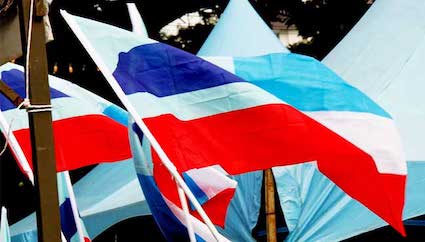Fallacy of Sabah’s harmonious existence

In fact, beneath the veneer of pretense of solidarity in Sabah is the entrenched chauvinistic tribal rivalry and religious bigotry. This is borne by the pattern of voting along racial and tribal lines.
Mohamed Ghouse Nasuruddin, Twentytwo13
Malaysians, especially from peninsular Malaysia, have been singing praises of Sabah as a paragon of intercultural and ethnic harmony, a unified and integrated society that purportedly transcends racial, religious and cultural schisms.
But the recent state elections have exposed their pretense of an integrated society.
It is evident that Sabahans have been misled into thinking that they experience a harmonious existence.
For so long, Sabahans have been lauded for their usage of the national language and sharing of cultural elements.
On the other hand, peninsular Malaysians have been accused of having a fretted and divisive society fraught with racial schisms and religious bigotry.
That they speak in many tongues, literally and metaphorically, and flaunt their chauvinistic identities, identifying themselves as Malay, Chinese, Indians and others, with respect to education, culture and more so politics.
This is undeniable and many have urged the West Malaysians to emulate the Sabah model.
In fact, beneath the veneer of pretense of solidarity in Sabah is the entrenched chauvinistic tribal rivalry and religious bigotry. This is borne by the pattern of voting along racial and tribal lines.
The Chinese returned all except one DAP candidate with increased majority.
Likewise, the non-Muslim Kadazan Dusun and Murut favoured candidates from these tribal communities.
The Bajaus, Brunei and other Muslim communities choose candidates from Umno and Bersatu who played up the religious and ethnic cards.
This chauvinistic sentiment took a toll on Warisan’s multi-ethnic and multi-religious accommodation and not being solely a Muslim entity.
When it comes to politics, Sabah is no different from peninsular Malaysia for it is beset with tribal, religious and racial schisms.
They have no qualms to character-assassinate their opponents, laying bare dirt, closeted skeletons and usually fabricating ugly and negative perceptions.
As in peninsular Malaysia, the ends justify the means.
But they are all united in one respect, that is, animosity against what they refer to as Malaya (peninsular Malaysia) as being the villain whom they accuse of having siphoned the wealth of Sabah for themselves.
Although this is not the actual situation as peninsular Malaysia helped develop Sabah in many ways, it becomes fodder to provoke animosity and lends support to the anti-federal sentiments by promoting the Sabah for Sabahan slogan.
Such is the trickery of the politicians who will stoop at nothing to achieve their greed and lust for power.
It is ironic that these politicians play up such sentiments to keep out the peninsular Malaysians when they have unrestricted access to all facilities in peninsular Malaysia.
Unlike peninsular Malaysians who must submit to Sabah immigration control, the Sabahans have free rein entering and leaving peninsular Malaysia as it is deemed as internal travel within the country.
Many Sabahans have made peninsular Malaysia their home, working and raising families here. Sabah for Sabahans is discriminatory.
Underneath the façade of harmonious existence, there is discrimination within the tribal matrix in Sabah. It even goes to the extent of labelling certain segments of the community as being illegal immigrants or PTI (pendatang tanpa izin) on the hereditary grounds of having Sulu or Brunei’s ancestors even though these people were born and bred there.
This is done to discredit and undermine candidates not aligned with certain factions to evoke the anti-PTI sentiments among the voters.
Thus, Sabah’s socio-political cultural matrix is no better than peninsular Malaysia’s. It may even be worse if we consider the party-hopping syndrome, which is the hallmark of Sabah’s politics that has perpetrated numerous changes of government.
It is, therefore, a fallacy to think that Sabah is an example of a unified integrated society that other segments of the Malaysian society should emulate. On the contrary, Sabahans could emulate the maturity of peninsular Malaysia’s socio-political culture.

